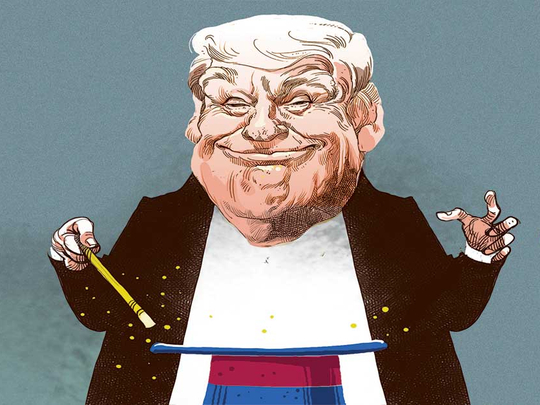
Since last week when it became clear that Donald Trump will, barring some extraordinary and unforeseen development, be the Republican nominee for US president, the world of political media has been dominated by two big questions. First: can the Republican Party as an institution survive Trump’s candidacy? And, second, to the extent that Trump has talked about foreign and economic policy what, if anything, can be determined about what he might do as president?
First, the Party. Saturday’s New York Times summarised the mood of the moment with a headline reading “Republican Party unravels over Trump’s takeover”. By Sunday the newspaper, and many other media outlets, were compiling and publishing lists of major Republicans (both in and out of office) who have come out for and against Trump.
So is the party irreparably damaged? Does last week’s front page cartoon in the New York Daily News showing the GOP’s elephant mascot lying in a coffin marked “Republican Party: 1854-2016” indicate what lies in store for the Party of Abraham Lincoln and Ronald Reagan? Tens of thousands of words have been written on this topic over the last week or so, but the short answer is: maybe, though probably not.
It is true that some senior Republicans have said they will never support Trump under any circumstances. Yet more than a few have come around in the week since he became the party’s presumptive nominee, and more are sure to follow.
Even as a widely disliked nominee, Trump is nearly certain to win a significant share of the vote in November. He will carry 15 or 16 states at a minimum. The country is so set in its political ways that the days when either party could nominate a candidate far from the mainstream and watch him lose 44 states (as Barry Goldwater did for the Republicans in 1964) or even 49 (Democrat George McGovern in 1972) are simply over.
Whatever happens, Trump is certain to reshape the party in his own image. If he wins, many Republicans will fall into line in the natural course of things.
Appeal to worst instincts
But even if he loses he will have proven that the nomination can be won through an appeal to the worst instincts of the GOP base. Come 2020 someone will try to win by tapping the anger and bigotry on which Trump feeds but in a way that makes party grandees less queasy.
This brings us to policy. Policy is important because while the best reason to oppose Trump is his bigotry, sexism and habit of threatening violence if he does not get what he wants, these are not what many Republican leaders complain about. For many in the GOP the real problem with Trump is his views on foreign policy, trade and taxes.
The foreign policy speech Trump delivered on April 27 was mostly vague pabulum (America should “always put the interest of the American people and American security above all else,” he said) and was contradictory in several places. Trump, for example, called for an end to American “nation-building” in the Middle East while also threatening new, widespread military action in the region.
He criticised the Obama administration’s “reckless, rudderless and aimless foreign policy”, but also said the US must be less, rather than more, predictable. That much of this flew in the face of both Republican and Democratic foreign policy since the Second World War and sounded terrifying to many American allies was something he seemed neither to understand nor care much about.
A few days later he told the financial news channel CNBC that the way to eliminate America’s national debt is simply to refuse to pay it — demanding that investors in US Treasury securities (which would include major banks and the sovereign wealth funds of most Gulf states) take a loss on what has, until now, been considered the safest investment on earth and one of the foundations of the global financial system. This received surprisingly little attention in the US media, but has surely been noticed by financial markets around the world.
The bottom line is that right now, with just under six months to go until Election Day, none of this is settled. And as the weeks and months pass it is all likely to become still more uncertain. Because while Trump’s record is consistent on a few things (notably his opposition to trade deals) it is hard not to conclude that on most policy matters he is simply making it up as he goes along — and does not feel bound today by anything he said last week let alone last month.
The good news is, that means Trump’s scary remarks on foreign and monetary policy should not be presumed to reflect what he would actually do in office. The bad news is that he’ll probably never acknowledge those policies as mistakes, and might replace them with even worse ideas between now and inauguration day.
Put another way: Trump claims that he wants unpredictability to be the hallmark of America’s dealings with the rest of the world. For a sense of how that might work, watch Trump’s campaign in the weeks and months to come.
Gordon Robison, a longtime Middle East journalist and US political analyst, teaches political science at the University of Vermont.











